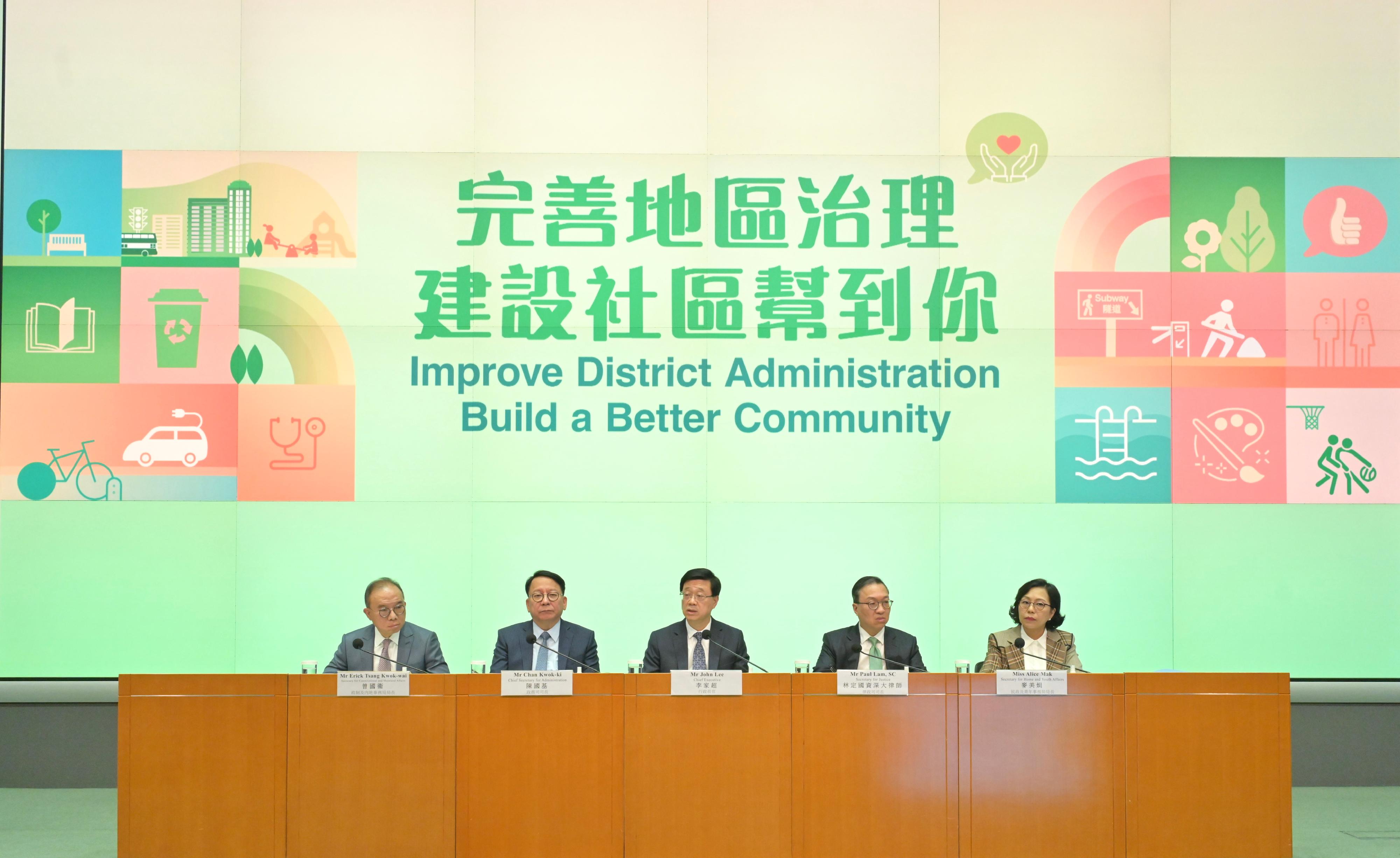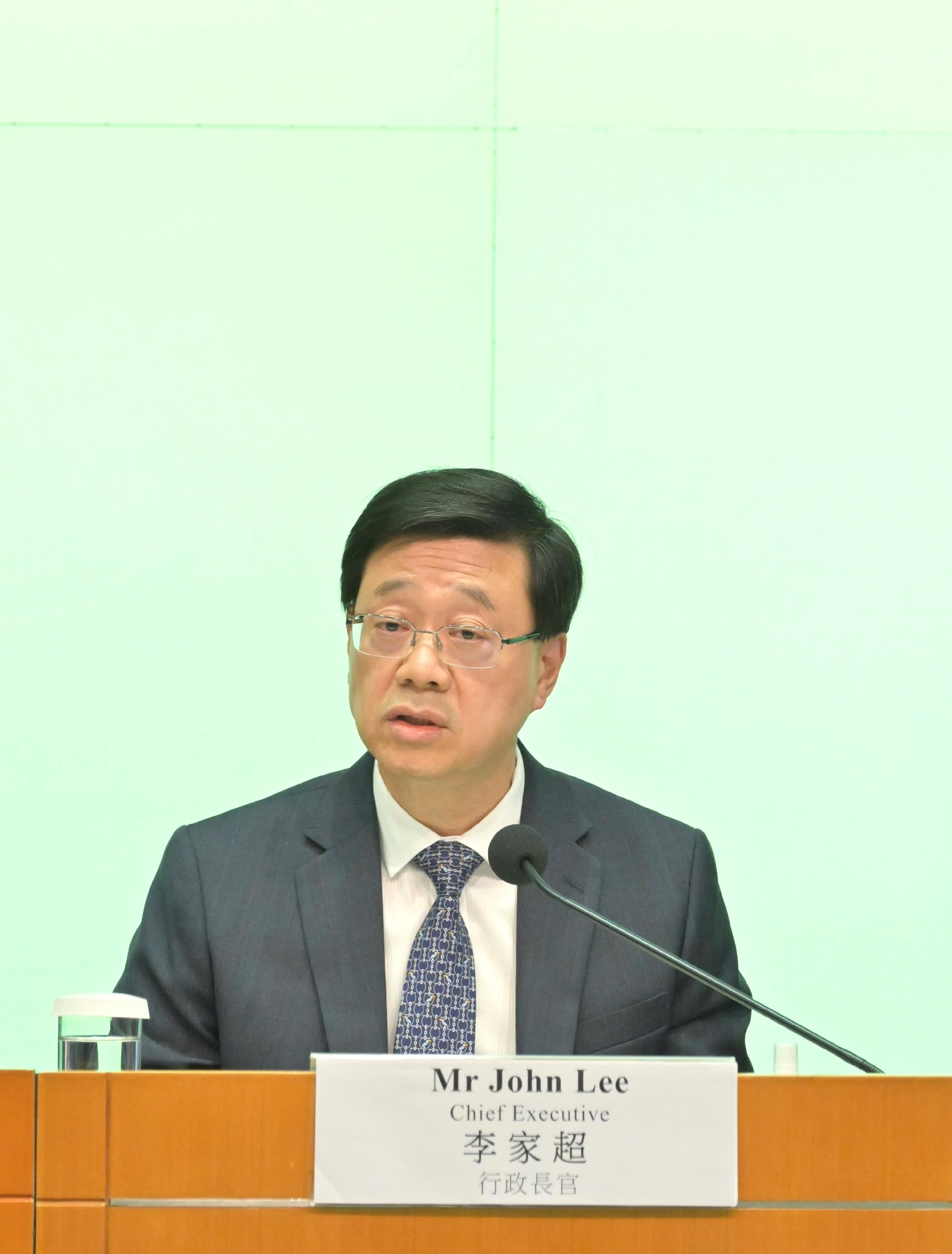Transcript of remarks of press conference on proposal to improve district administration (with photo/video)
******************************************************************************************
Reporter: Hello, Mr Lee. You repeatedly highlighted the impact of the 2019 protests on district administration. But now we already have the National Security Law and the society has been back to normal. But the proportion of directly elected seats will be even lower than that of the district boards in the 1980s. So is this a regression as suggested by some? And second question, is the Government aware of the potential drawbacks of having District Officers to chair the DCs (District Councils), say top-down management might stifle voices from the community and there could be no sense of ownership to the Council. And last question, with the new nomination requirements, would the legitimacy of the bodies be affected if there are no pro-democracy members decided to join the upcoming polls? Thank you.
Chief Executive: First of all, it is not the 2019 protests. It is the “black violence”. It is the attempt to make Hong Kong “independent” and the attempt to cause disaster to Hong Kong society as a whole that we need to prevent. I think that has been made very clear. We lived through that, and don't forget it. We have to bear that in mind so as to ensure that in the long run, the system will protect us from all this chaotic and harmful situation to arise again.
The second thing is the design of the system is to take into consideration of the actual happening in Hong Kong. And of course, considering what I have mentioned, the chaotic and disastrous situations that we all experienced. The whole design is for the benefit of society as a whole because it will let people who has the heart to contribute to the districts to join through different channels. At the end of the day, what is important for any system to be considered as a good system is what it will deliver. What this system will deliver will be a District Council which will take the overall interest of the district and if more possibly, the whole interest of Hong Kong, into account when they deliver their services and do the consultations. What happened in the sixth-term District Councils as I have described already indicated that we have to ensure that the bad situation doesn't come back again. And the different setups have been taken into consideration to make the system to be representative because those who are familiar with district matters will, through various systems to get into the District Council, for example, through the District Committees Constituency and also through all these arrangements, it will be the people who are connected to the district will likely be allowed through various channels to enter the District Council. It will also ensure that overall stability of Hong Kong through a smooth process of District Council election and also different channels to get into the District Council.
As regards the District Officers to be the chairmen, first of all, it will ensure that the District Council will operate as Article 97 of the Basic Law requires. That is to be consulted on issues that the Government wants to be consulted on, and also to provide services in regard to culture, recreation, etc. It will also reflect the principle of administration-led governance. The District Council is part of the Hong Kong Government's governance system. That is why we have also strengthened the whole system with the creation of two committees; one chaired by the Chief Secretary for Administration and another chaired by the Deputy Chief Secretary for Administration. It will create more ownership because the Council will focus their full attention on discharging the two responsibilities that the Basic Law wants them to discharge, which is to be a consultative organisation and to deliver service as the Government wants.
As regard legitimacy, I think the Council's legitimacy is derived from what it achieved for the benefit of society. I have very strong confidence that the District Council as we have proposed now will be able to discharge their basic functions better and more efficiently to satisfy the demands and the wants of the people in the districts by ensuring that they will do their consultations properly, with good focus and also rendering services as the Government wants.
Reporter: Mr Lee, throughout this whole press conference till this moment, if my observation is right, you have been avoiding, or maybe you are not avoiding, but you have not been using or mentioning the word "democracy", "democratic" or "democratisation". Does the Government also find it very hard to convince the people that this is a democratic or democratising arrangement for the District Council? And in fact, the directly elected seats, the percentage now - 20 per cent - is even lower than when the District Council first came into being in 1982. Is the current Government less confident than the British colonial government in terms of giving residents their very basic right to choose their community representatives? Actually, the democratisation of District Council has been a decades-long effort that was also supported by the Government, because it was the last reform in 2013 to 2016 that brought us the District Council today. So when the Government said a wrong path was chosen in the past, is it also saying that the past administration of Hong Kong SAR chose the wrong path by democratising the District Council? Thank you.
Chief Executive: First of all, I have to correct you in mentioning that the colonial government was introducing real democratic process in Hong Kong. The process that was introduced was in some way to create a situation which is incompatible with the Basic Law in regard to the set-up of the District Council. The Basic Law, from day one, has already set out very clearly: the function of the District Council is for consultation and to render services. At different stages of Hong Kong, there are different problems to deal with. I think before 2019, nobody expected there was such serious “black violence”, “dark violence”, and serious attempt to make Hong Kong “independent” and also to cause disaster to Hong Kong as a whole. At any moment of time, I think the Hong Kong SAR Government did their very best to run systems or to enforce policies that were in the overall good of Hong Kong. But when special situations arise, then of course we have to ensure that the disadvantages and the harm that those situations have caused Hong Kong will not be repeated. We have to prevent them from happening again. That’s why we have chosen the method that we have proposed now to improve district administration and build a better community.
What is best for Hong Kong, I think, has to be determined by the result any system will give. First of all, I do not agree that pure counting of election votes means democracy, and I think different locations, different countries, different places have their own systems that must take into consideration of all characteristics and all elements of these places. So what is good for Hong Kong has to take into consideration of what happened in the past and what we will be facing in the future. At the end of the day, we are improving district administration, so as to let people in that district benefit from government policies, including its formulation and implementation. If, through whatever method the District Council was born, the end result was disaster and was bad administration for the people in that district, it cannot be a good system. I will regard what we are proposing now a process that has the advantages of ensuring that all the havoc and the harm will be prevented, system-wise, and ensuring that those who then become District Councillors will perform to the satisfaction of what the responsibilities they are required to carry out under Article 97 of the Basic Law.
(Please also refer to the Chinese portion of the transcript.)
Ends/Tuesday, May 2, 2023
Issued at HKT 20:44
Issued at HKT 20:44
NNNN






